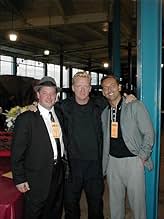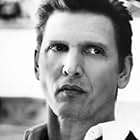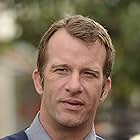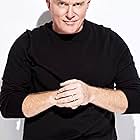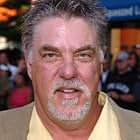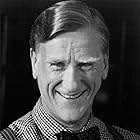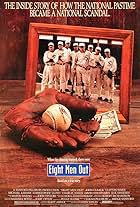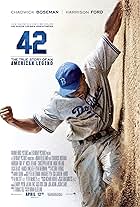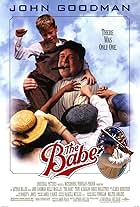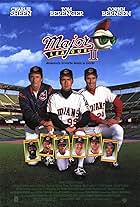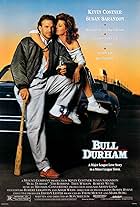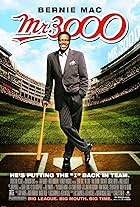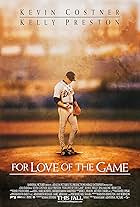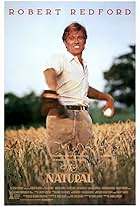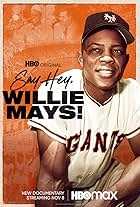Roger Maris and Mickey Mantle race to break Babe Ruth's single-season home run record.Roger Maris and Mickey Mantle race to break Babe Ruth's single-season home run record.Roger Maris and Mickey Mantle race to break Babe Ruth's single-season home run record.
- Won 2 Primetime Emmys
- 4 wins & 26 nominations total
- Director
- Writer
- All cast & crew
- Production, box office & more at IMDbPro
Storyline
Did you know
- TriviaBecause there was no accurate documentation of it, no one knew what the precise color of the Yankee Stadium seats were in 1961. When faced with this dilemma, production designer Rusty Smith was told that Billy Crystal had an old bleacher seat from Yankee Stadium. Though the seat was completely painted blue, Smith found one small chip of green on the seat that proved to be the true Yankee Stadium green.
- GoofsWhen Maris is talking with his wife from a payphone after the birth of their son, he's talking on a payphone that is a single-slot model. In 1961, the three slot version (25 cent, 10 cent 5 cent) was still in use. The single-slot phone was not introduced until 1965.
- Quotes
Bob Sheppard: Good afternoon, ladies and gentlemen. Welcome to Yankee Stadium.
- Crazy creditsYankee Stadium played by Tiger Stadium
- SoundtracksDream Lover
Written and Performed by Bobby Darin
Courtesy of Atco Records
By Arrangement with Warner Special Products
Featured review
Billy Crystal lovingly looks back at the New York Yankees of his childhood in `61.' The movie follows teammates Roger Maris and Mickey Mantle through the 1961 baseball season, in which Maris did the unimaginable - and unforgivable, in the eyes of many fans. He broke Babe Ruth's sacred 1927 record of 60 home runs in a season. Mantle chasing the Babe was one thing; Maris doing it was quite another. The self-proclaimed redneck from North Dakota, ill at ease around the big city media and hoopla, was not the golden boy that Mantle was. The Mick had owned New York for years - especially since his phenomenal triple crown year in 1956. Maris had come over from the lowly Kansas City A's a year earlier and had enjoyed what many assumed was his `career year' in 1960, winning the American League Most Valuable Player (MVP) award.
The movie focuses on more than just the home run chase. It gives a nice portrayal of Mantle and Maris as men and gives a fairly nice look at Major League life in the slightly less jaded early 1960s. The baseball scenes are quite realistic. Adding to the enjoyment for real baseball fans is the careful attention to detail. Even the opposing pitchers, trying to keep Maris from tying and breaking Babe Ruth's home run record, look real. Knuckleballer Hoyt Wilhelm looks just LIKE Hoyt Wilhelm. Jim Bunning throws just LIKE Jim Bunning. Jake Wood (seen only in a long shot, as a baserunner) looks like Jake Wood! I could go on, but won't. Attention to detail is a major plus for this production. (Note: In the midst of writing this, I just scrolled down the credits and saw that Wilhelm was portrayed by former Major League knuckleballer, Tom Candiotti! Sheesh! No WONDER his knuckleball looked real! It WAS real! lol)
Maris is played by Barry Pepper, whose physical resemblance to Maris borders on the scary! From his crewcut to his facial expressions, to his physique, Pepper looks exactly like Roger Maris in 1961! He seems to master the swing and other baseball skills, making me guess that he had played college baseball. He also turns in a convincing performance as the introverted Maris becomes the center of attention, controversy and criticism - not just in The Big Apple, but across the nation.
The performance of Thomas Jane as Mantle is also outstanding. He and Pepper accurately portray the stress of a long and grueling baseball season, made more so by separations from loved ones, the pressure of a pennant race and the ever-increasing pressure and scrutiny of the chase on Babe Ruth's hallowed record of 60 home runs. Jane captures the charisma and genuine likeability of Mantle, as well as his less attractive side as a non-attentive parent and unfaithful husband. Chris Bauer, meanwhile, is delightful as outfielder Bob Cerv (pronounced `serve'), a teammate of Maris in KC and his (and later Mantle's) roommie with the Yankees. Crystal's daughter, Jennifer Crystal Foley, is also strong as Pat Maris, struggling hard to support her stressed-out husband and manage their growing family, from halfway across the country. The rest of the cast is first-rate, as well.
The tie-in with the present day (or 1998, at least) shattering of Maris' record by Mark McGwire is effective and gives a more heartwarming feel to the film. McGwire was all class in 1998, going out of his way to accommodate the Maris family and to honor Maris himself (who had died several years earlier); of course he was buoyed by a nation that seemed to urge him on, rather than spit venom at him, like the one Maris faced. The final effect seems to be closure for the spirit of Roger Maris. Perhaps it DID take his record being broken for baseball to forgive the outsider from Dakota for having the audacity to break Ruth's record. Perhaps it DID take the goateed McGwire hitting 70 home runs for baseball fans to realize the significance and difficulty of Maris belting 61 in '61 - still the American League record, by the way. Crystal brings home his film in fine style. He also keeps it fairly clean. One off-color clubhouse exchange between Mantle and Whitey Ford seems to be tossed in primarily to give a sense of it BEING a Big League locker room. Thereafter, the film is largely suitable for the entire family. Overall, I would call `61' one of the better baseball movies ever made.
The movie focuses on more than just the home run chase. It gives a nice portrayal of Mantle and Maris as men and gives a fairly nice look at Major League life in the slightly less jaded early 1960s. The baseball scenes are quite realistic. Adding to the enjoyment for real baseball fans is the careful attention to detail. Even the opposing pitchers, trying to keep Maris from tying and breaking Babe Ruth's home run record, look real. Knuckleballer Hoyt Wilhelm looks just LIKE Hoyt Wilhelm. Jim Bunning throws just LIKE Jim Bunning. Jake Wood (seen only in a long shot, as a baserunner) looks like Jake Wood! I could go on, but won't. Attention to detail is a major plus for this production. (Note: In the midst of writing this, I just scrolled down the credits and saw that Wilhelm was portrayed by former Major League knuckleballer, Tom Candiotti! Sheesh! No WONDER his knuckleball looked real! It WAS real! lol)
Maris is played by Barry Pepper, whose physical resemblance to Maris borders on the scary! From his crewcut to his facial expressions, to his physique, Pepper looks exactly like Roger Maris in 1961! He seems to master the swing and other baseball skills, making me guess that he had played college baseball. He also turns in a convincing performance as the introverted Maris becomes the center of attention, controversy and criticism - not just in The Big Apple, but across the nation.
The performance of Thomas Jane as Mantle is also outstanding. He and Pepper accurately portray the stress of a long and grueling baseball season, made more so by separations from loved ones, the pressure of a pennant race and the ever-increasing pressure and scrutiny of the chase on Babe Ruth's hallowed record of 60 home runs. Jane captures the charisma and genuine likeability of Mantle, as well as his less attractive side as a non-attentive parent and unfaithful husband. Chris Bauer, meanwhile, is delightful as outfielder Bob Cerv (pronounced `serve'), a teammate of Maris in KC and his (and later Mantle's) roommie with the Yankees. Crystal's daughter, Jennifer Crystal Foley, is also strong as Pat Maris, struggling hard to support her stressed-out husband and manage their growing family, from halfway across the country. The rest of the cast is first-rate, as well.
The tie-in with the present day (or 1998, at least) shattering of Maris' record by Mark McGwire is effective and gives a more heartwarming feel to the film. McGwire was all class in 1998, going out of his way to accommodate the Maris family and to honor Maris himself (who had died several years earlier); of course he was buoyed by a nation that seemed to urge him on, rather than spit venom at him, like the one Maris faced. The final effect seems to be closure for the spirit of Roger Maris. Perhaps it DID take his record being broken for baseball to forgive the outsider from Dakota for having the audacity to break Ruth's record. Perhaps it DID take the goateed McGwire hitting 70 home runs for baseball fans to realize the significance and difficulty of Maris belting 61 in '61 - still the American League record, by the way. Crystal brings home his film in fine style. He also keeps it fairly clean. One off-color clubhouse exchange between Mantle and Whitey Ford seems to be tossed in primarily to give a sense of it BEING a Big League locker room. Thereafter, the film is largely suitable for the entire family. Overall, I would call `61' one of the better baseball movies ever made.
Details
- Runtime2 hours 9 minutes
- Color
- Sound mix
- Aspect ratio
- 1.85 : 1
Contribute to this page
Suggest an edit or add missing content






